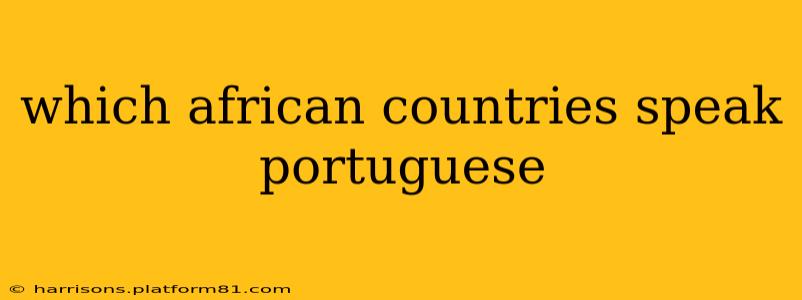Which African Countries Speak Portuguese?
Portuguese is a prominent language in Africa, a legacy of centuries of Portuguese colonization. Understanding which African nations predominantly speak Portuguese is crucial for anyone interested in African history, culture, or business. This article will explore the five African countries where Portuguese is an official language, delving into its prevalence and cultural significance.
Five Lusophone African Nations:
The five African countries where Portuguese serves as an official language are:
-
Angola: Portuguese is the official language of Angola, a vast country in southwestern Africa. While numerous local languages are spoken, Portuguese is the lingua franca, used in government, education, and commerce. Its presence is deeply ingrained in Angolan culture, influencing literature, music, and everyday communication.
-
Mozambique: Located on the southeastern coast of Africa, Mozambique also uses Portuguese as its official language. Similar to Angola, it's essential for formal interactions and serves as a bridge between diverse ethnic groups. The country's vibrant cultural scene reflects a rich blend of Portuguese and indigenous influences.
-
Guinea-Bissau: Situated on the west coast of Africa, Guinea-Bissau is a smaller nation where Portuguese holds official status. Despite the presence of numerous local languages, Portuguese remains crucial for national unity and international communication.
-
São Tomé and Príncipe: This island nation off the west coast of Central Africa is another Portuguese-speaking country. Portuguese is the official language, a reflection of its colonial past and a key element in its national identity.
-
Cape Verde: An archipelago off the west coast of Africa, Cape Verde is the fifth African nation with Portuguese as its official language. The unique Creole language of Cape Verde, based on Portuguese, showcases the enduring linguistic impact of Portuguese colonization.
What other languages are spoken in these countries?
Each of these Portuguese-speaking African countries boasts a rich tapestry of local languages and dialects. These indigenous tongues reflect the diverse ethnicities and cultural heritage of each nation. While Portuguese plays a dominant role in formal settings, local languages remain vital for daily life and cultural preservation within communities. The exact number and types of languages vary significantly between countries.
Is Portuguese spoken in other parts of Africa?
While Portuguese is official in the five countries mentioned above, it’s also spoken as a second language or by minority communities in other African nations. This reflects historical trade links, migration patterns, and continued cultural exchange. The extent of Portuguese usage in these regions varies widely, depending on factors such as proximity to Portuguese-speaking countries and historical connections.
How did Portuguese become the official language in these African countries?
The presence of Portuguese in these African countries is a direct result of Portuguese colonization. Over centuries of colonial rule, Portuguese became the language of administration, education, and commerce. Even after independence, Portuguese remained the official language in many of these nations, reflecting its continued importance in governmental, educational, and business sectors.
Why is learning Portuguese important in Africa?
Learning Portuguese in Africa opens doors to a wide range of opportunities. It’s essential for accessing education, employment, and business ventures within Portuguese-speaking communities. It also fosters intercultural understanding and strengthens connections across linguistic and geographical boundaries within Africa and globally. The growing economic and political influence of Portuguese-speaking countries further underscores the importance of this language in the African context.
This article provides a comprehensive overview of Portuguese-speaking African countries. Understanding the language's role in these nations is essential for appreciating their history, culture, and current socio-economic landscape. Further research into the individual countries will reveal even greater depth and nuance regarding the language's use and significance in each region.
